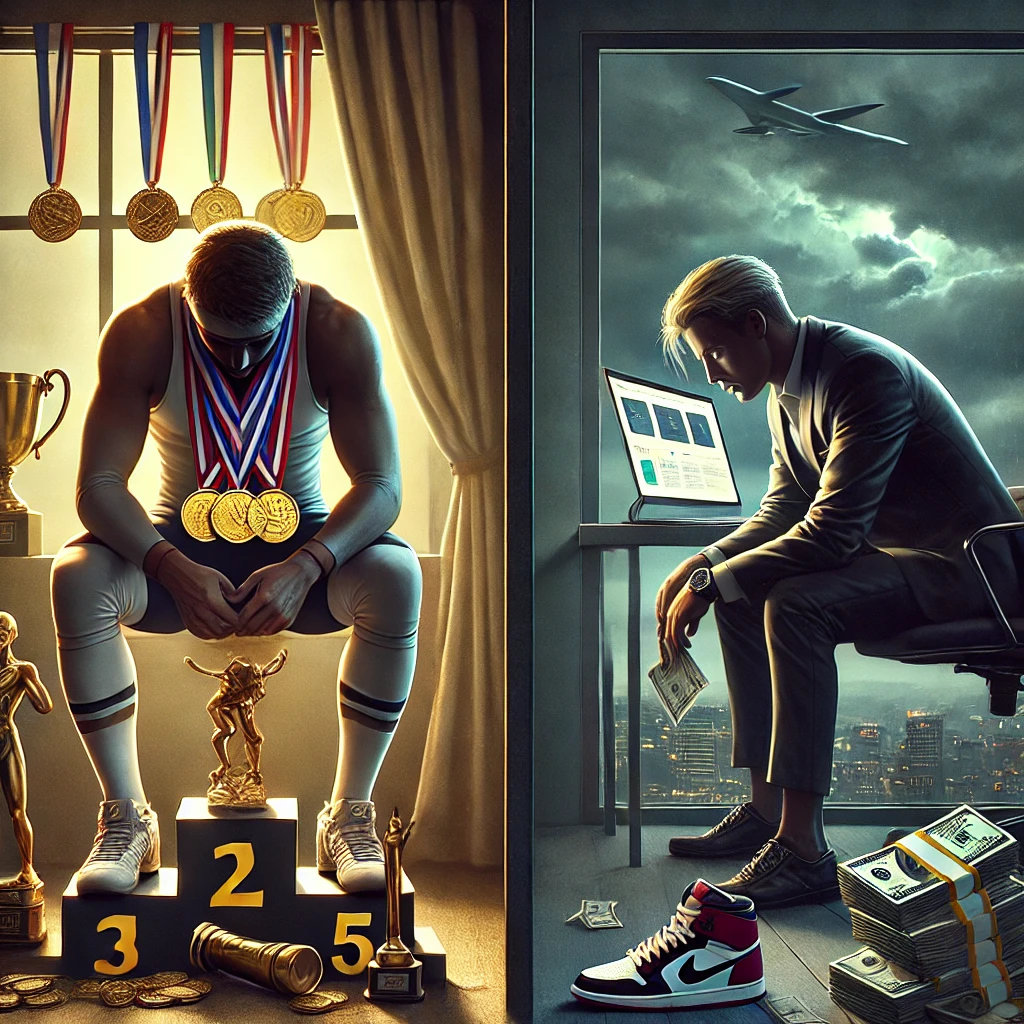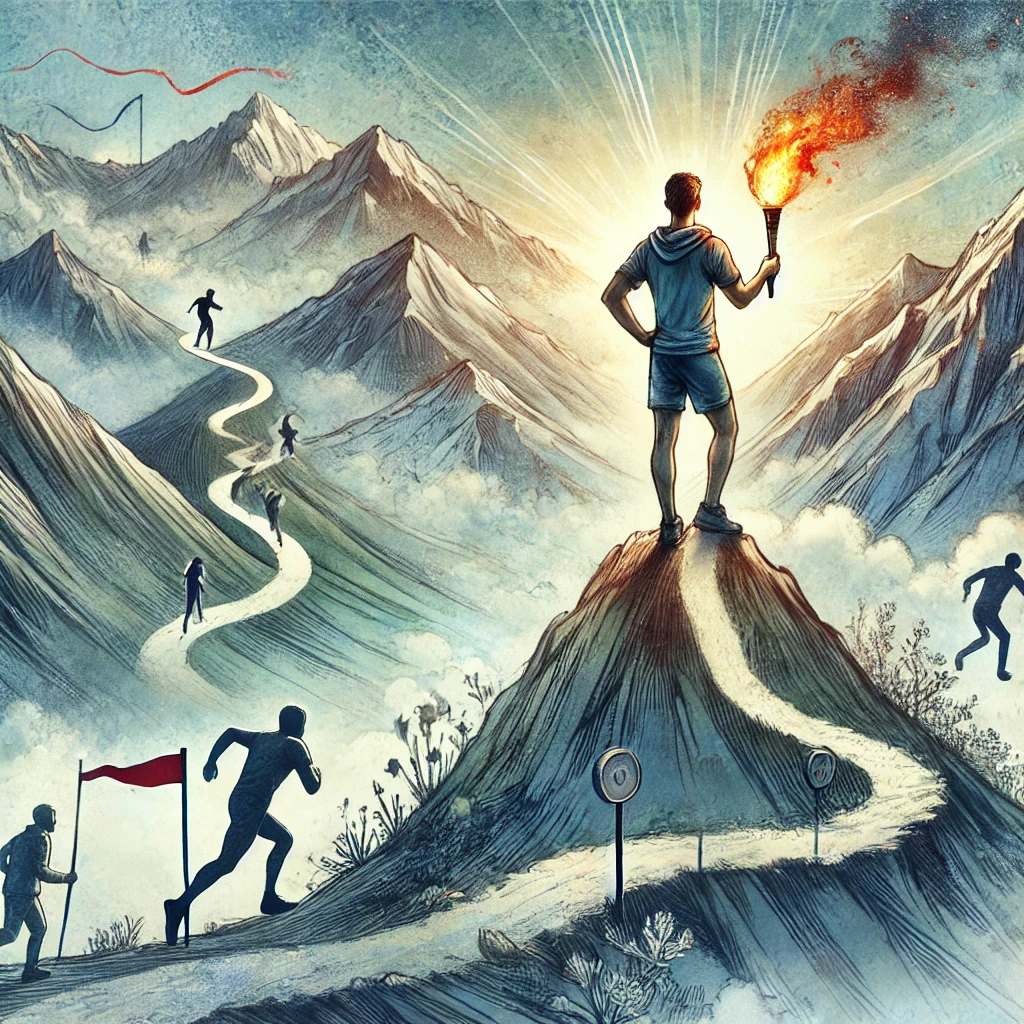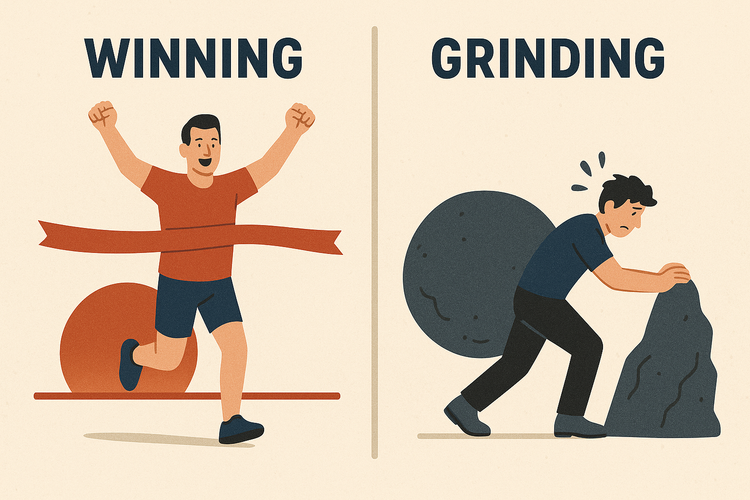The False Peak

There’s a moment I’ve seen play out across every kind of Entrepreneur.
You hit the milestone. You achieve what you set out to do. The launch lands. The raise closes. The revenue target rolls in. You stand at the top of the mountain you’ve been climbing for months, years or even decades.
Thanks for reading Beyond The Peak! Subscribe for free to receive new posts and support my work.
And instead of elation?
You feel… off. Numb. Lost. Even low.
“I thought this would feel different.”
“I should be happier than I am.”
“What now?”
This is what we call the False Peak.
It’s disorienting. Because you’ve been told that the goal is the reward. But when you get there and realize it’s not—you start questioning everything.
I’ve lived it. I’ve watched elite athletes live it. And I’ve coached countless entrepreneurs through it.
The False Peak isn’t failure. It’s revelation.
And what it reveals can shape your entire journey forward.
The Myth of Arrival
In mountaineering, a false peak is a cruel trick of perspective—it looks like the summit from below. You train for it. Plan for it. Obsess over it.
But when you arrive, you realize the real summit is still ahead. And sometimes, that realization is more crushing than the climb.
Founders experience this when they achieve early wins that were supposed to “mean something.”
- The press feature
- The funding round
- The first 10,000 users
- The first $1M in revenue
These are good things. But they are not destinations. And when we mistake them for finish lines, we feel betrayed by our own expectations.
Psychologically, this moment is deeply unsettling.
Dr. Tal Ben-Shahar, a Harvard-trained happiness researcher, coined the term “arrival fallacy” to describe this illusion—the belief that happiness lies at the next goal, the next milestone, the next external marker of success.
“Attaining the goal was not as satisfying as I expected. The road towards the goal contributed more to my well-being than reaching the goal itself.”
—Tal Ben-Shahar
The False Peak exposes this illusion in brutal clarity.
And yet, navigating it requires more than optimism—it requires resilience and intentionality. It doesn’t just happen. Let’s take the Stockdale Paradox as reference point.
Popularized by Jim Collins in his book Good to Great, it’s named after Admiral Jim Stockdale, who survived brutal years as a prisoner of war in Vietnam. He credited his survival to a paradoxical mindset: maintaining unwavering faith that he would prevail in the end—and confronting the brutal facts of his current reality.
"You must never confuse faith that you will prevail in the end—which you can never afford to lose—with the discipline to confront the most brutal facts of your current reality."
—Jim Collins, Good to Great
General Stockdale observed something chilling: the ones who didn’t make it weren’t the pessimists. It was the optimists. Those who clung to unrealistic hope—“We’ll be out by Christmas” or “Surely by Easter”—were the ones who broke when those dates passed unmet. They couldn’t cope with the prolonged dissonance between their expectations and their harsh reality.
Stockdale survived because he embraced both sides of the paradox:
- He never gave up hope that he would get out.
- But he also faced each day with brutal honesty and clarity.
The False Peak offers founders this same moment: to look honestly at the disillusionment of achievement, and to anchor into a deeper conviction about what comes next.
Not blind positivity. Not fatalism. But grounded clarity—and the kind of internal grit that can only come from staring down both reality and possibility at the same time.
The False Peak offers founders this same moment: to look honestly at the disillusionment of achievement, and to anchor into a deeper conviction about what comes next.
Not blind positivity. Not fatalism. But grounded clarity.
What It Means to Peak
In high-performance sport, the idea of a "peak" is sacred. It’s the moment when everything converges: training, strategy, timing, mindset. Athletes build entire seasons—sometimes careers—around peaking at the right moment.
But here’s the paradox:
The higher the peak, the steeper the emotional drop.
After the confetti falls and the cameras turn away, many athletes are left asking: Now what?
Take gymnast Simone Biles. After achieving almost unparalleled success, she withdrew mid-competition at the Tokyo Olympics—not from injury, but from a mental health crisis. The pressure of being the best became its own burden.
Usain Bolt, after winning nine Olympic gold medals, talked openly about the lack of motivation and sense of aimlessness that followed retirement. Michael Phelps, who famously won eight gold medals in a single Olympics, has shared publicly about his post-Games depression. In his words:
*"I didn’t want to be alive anymore. I’d achieved everything I set out to do. And I was still empty."
This isn’t limited to sport.
Entrepreneurs experience the same collapse.
After a major exit, after a unicorn valuation, after a product launch that dominates the market—many founders spiral. They’ve reached what they thought was the summit, only to find it wasn’t what they expected. Elon Musk, after selling PayPal, described feeling lost and purposeless, even with a massive payout. Whitney Wolfe Herd, founder of Bumble, described loneliness and anxiety post-IPO.
The world sees glory. But behind the scenes? Identity crisis. Emotional crash. A sense of disconnection from the person they thought success would make them.
Why? Because the external peak rarely satisfies the internal questions we’ve avoided along the way.
After my biggest business failure, I spent years rebuilding. I joined a friend’s company. Completed my MBA. Built new ventures. Started coaching. And over time, I climbed out of the hole—financially, emotionally, and professionally.
Then one day I realized: I wasn’t struggling anymore. Life was stable. I was doing meaningful work. People were affirming it.
And yet—I felt a strange hollowness.
Not because I was ungrateful. Not because I wanted more. But because what I’d built wasn’t connected deeply enough to who I was becoming.
This moment became a pivot—not into new goals, but into deeper reflection:
- What am I building, really?
- Who am I becoming as I build?
- What does success look like beyond numbers and optics?
That’s when the False Peak stopped feeling like a letdown and started feeling like an invitation.

Athletes Feel It and so do Entrepreneurs
Michael Jordan felt it after winning his first NBA championship. So did Phelps after Beijing. Simone Biles talked about it after Tokyo.
When the goal becomes everything, you will eventually hit a moment where everything feels like nothing.
One of the most poignant expressions of this idea comes from the movie Cool Runnings, where the coach tells his team:
"If you're not enough without the gold, you'll never be enough with it."
The coach, Irv Blitzer, was himself a former Olympic gold medalist who had lost his way after being caught cheating in an olympics and sought redemption through coaching a Jamaican bobsled team. That line wasn't just for the athletes—it was for himself.
That single line captures the essence of the False Peak. If your identity hinges on the outcome, even the highest achievement will feel hollow. It’s not about dismissing ambition—it’s about anchoring it in something deeper than applause.
In elite sport, we prepare athletes for this drop-off. We coach identity outside of performance. We teach that goals are markers—not definitions.
Entrepreneurs need the same training.

Reframing the Peak
Here’s the shift:
The peak isn’t the reward.
The person you become along the climb is.
When you understand this, your goals don’t lose power—they gain meaning.
Because they stop being about proving something.
And start being about practicing something.
"Success is not what you achieve. It's who you become on the way there."
—John Maxwell
This is how you build with peace, not pressure. With identity, not ego. With purpose, not panic.
Don’t Waste the False Peak
If you’re feeling disoriented after a big win—you’re not broken. You’re awake.
Use that clarity.
The False Peak is a gift. Because it reveals where your ladder is leaning. And it invites you to re-anchor your climb.
"Where you are is not where you have to stay. But what you do with what you see—that’s what defines you."
—Switchfoot, “Dare You to Move”
You don’t need a new mountain. You need a new reason to climb.
Reflective Question:
- What if the truest value of your last big win wasn’t in the achievement itself—but in revealing where and how you’re truly anchored?
- Would you be willing to sit with the silence long enough to hear what your soul really wants next?
- Who are you becoming through your success—and is that someone you want to keep becoming? Maybe fast forward a few years and see if you like the picture you see.
- What deeper ambition might be calling you now that the surface-level goal is behind you?
Until next time,
Jaco
Thanks for reading Beyond The Peak! Subscribe for free to receive new posts and support my work.



